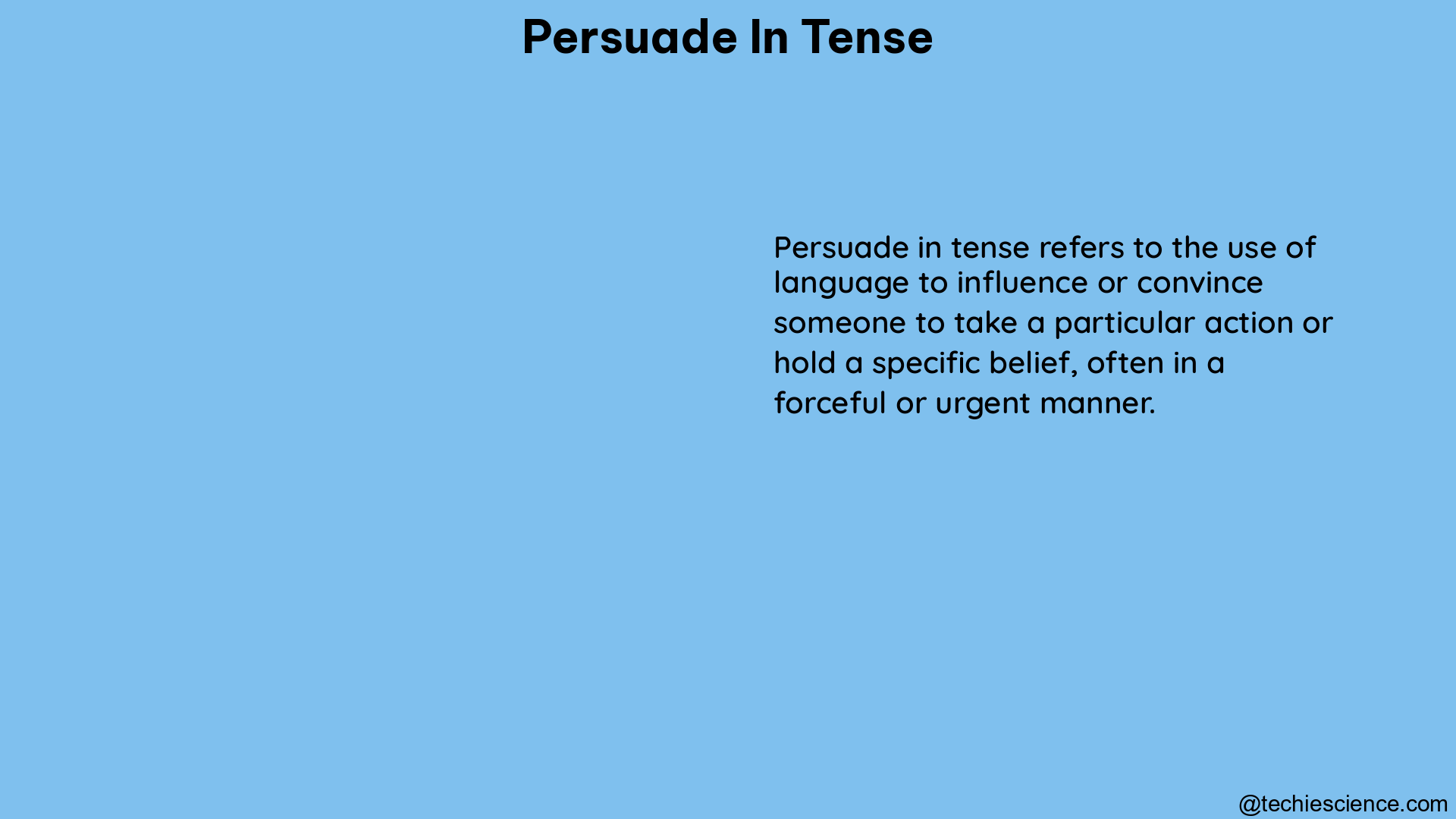Persuade in tense involves understanding the various forms of the verb “persuade” across different tenses. This comprehensive guide will provide you with a deep dive into the intricacies of using the verb “persuade” in various tenses, complete with detailed explanations and examples to help you become a master of persuasive language.
Present Tense
The present tense of the verb “persuade” is used to express actions or states that are happening in the present moment. Here’s a breakdown of the present tense forms:
| Person | Singular | Plural |
|---|---|---|
| First | I persuade | We persuade |
| Second | You persuade | You persuade |
| Third | He/She/It persuades | They persuade |
Examples:
– “I persuade my boss to consider my proposal.”
– “You persuade the client to sign the contract.”
– “She persuades the team to try a new marketing strategy.”
– “We persuade the community to support our local charity.”
– “They persuade the government to implement new environmental policies.”
Past Tense

The past tense of the verb “persuade” is used to express actions or states that occurred in the past. Here’s a breakdown of the past tense forms:
| Person | Singular | Plural |
|---|---|---|
| First | I persuaded | We persuaded |
| Second | You persuaded | You persuaded |
| Third | He/She/It persuaded | They persuaded |
Examples:
– “I persuaded my boss to consider my proposal last week.”
– “You persuaded the client to sign the contract yesterday.”
– “She persuaded the team to try a new marketing strategy last month.”
– “We persuaded the community to support our local charity last year.”
– “They persuaded the government to implement new environmental policies last decade.”
Past Participle
The past participle of the verb “persuade” is used to form the present perfect and past perfect tenses. The past participle form is the same for all persons and numbers:
- All forms: persuaded
Examples:
– “I have persuaded my boss to consider my proposal.”
– “You had persuaded the client to sign the contract before they left.”
– “She has persuaded the team to try a new marketing strategy.”
– “We had persuaded the community to support our local charity.”
– “They have persuaded the government to implement new environmental policies.”
Present Participle
The present participle of the verb “persuade” is used to form the present continuous tense. The present participle form is the same for all persons and numbers:
- All forms: persuading
Examples:
– “I am persuading my boss to consider my proposal.”
– “You are persuading the client to sign the contract.”
– “She is persuading the team to try a new marketing strategy.”
– “We are persuading the community to support our local charity.”
– “They are persuading the government to implement new environmental policies.”
Present Perfect Tense
The present perfect tense of the verb “persuade” is used to express actions or states that have been completed in the present. Here’s a breakdown of the present perfect tense forms:
| Person | Singular | Plural |
|---|---|---|
| First | I have persuaded | We have persuaded |
| Second | You have persuaded | You have persuaded |
| Third | He/She/It has persuaded | They have persuaded |
Examples:
– “I have persuaded my boss to consider my proposal.”
– “You have persuaded the client to sign the contract.”
– “She has persuaded the team to try a new marketing strategy.”
– “We have persuaded the community to support our local charity.”
– “They have persuaded the government to implement new environmental policies.”
Past Perfect Tense
The past perfect tense of the verb “persuade” is used to express actions or states that were completed before another past action or state. Here’s a breakdown of the past perfect tense forms:
| Person | Singular | Plural |
|---|---|---|
| First | I had persuaded | We had persuaded |
| Second | You had persuaded | You had persuaded |
| Third | He/She/It had persuaded | They had persuaded |
Examples:
– “I had persuaded my boss to consider my proposal before the meeting.”
– “You had persuaded the client to sign the contract before they left the office.”
– “She had persuaded the team to try a new marketing strategy before the campaign launch.”
– “We had persuaded the community to support our local charity before the fundraising event.”
– “They had persuaded the government to implement new environmental policies before the election.”
Future Tense
The future tense of the verb “persuade” is used to express actions or states that will occur in the future. Here’s a breakdown of the future tense forms:
| Person | Singular | Plural |
|---|---|---|
| First | I will persuade | We will persuade |
| Second | You will persuade | You will persuade |
| Third | He/She/It will persuade | They will persuade |
Examples:
– “I will persuade my boss to consider my proposal next week.”
– “You will persuade the client to sign the contract tomorrow.”
– “She will persuade the team to try a new marketing strategy next month.”
– “We will persuade the community to support our local charity next year.”
– “They will persuade the government to implement new environmental policies in the future.”
Future Perfect Tense
The future perfect tense of the verb “persuade” is used to express actions or states that will be completed before another future action or state. Here’s a breakdown of the future perfect tense forms:
| Person | Singular | Plural |
|---|---|---|
| First | I will have persuaded | We will have persuaded |
| Second | You will have persuaded | You will have persuaded |
| Third | He/She/It will have persuaded | They will have persuaded |
Examples:
– “I will have persuaded my boss to consider my proposal before the meeting.”
– “You will have persuaded the client to sign the contract before they leave the office.”
– “She will have persuaded the team to try a new marketing strategy before the campaign launch.”
– “We will have persuaded the community to support our local charity before the fundraising event.”
– “They will have persuaded the government to implement new environmental policies before the election.”
By mastering the various tenses of the verb “persuade,” you can effectively communicate your persuasive messages and influence your audience with precision and clarity. Remember to practice using these forms in your writing and speaking to become a true master of persuasive language.
Reference:
- https://simple.wiktionary.org/wiki/persuaded
- https://www.wordreference.com/conj/enverbs.aspx?v=persuade
- https://www.collinsdictionary.com/us/conjugation/english/persuade

Hi…..I’m a graduate with a Bachelor’s degree in English Literature. I wish to do a Masters in the same field someday and continue my career in Academia.
Let’s connect through LinkedIn: